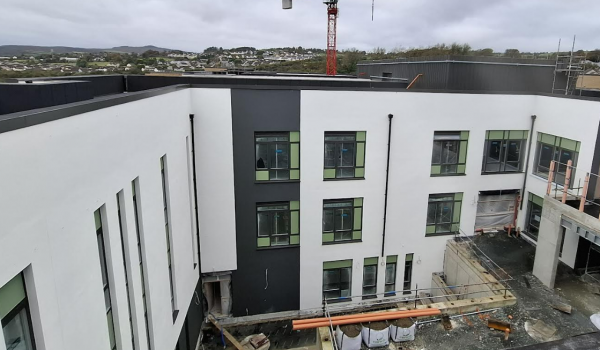
A senior Health Promotion officer with the HSE says the establishment of two new community-based health and well-being hubs in Donegal is already paying dividends.
Under the ‘Community Health Sync Project’, the North Donegal hub has been set up in Letterkenny, with the South Donegal one is based in Ballyshannon.
The project which is being delivered by the Donegal Local Development Company is aimed at offering people specific plans and supports so that they can improve their own health and prevent a range of illnesses and conditions.
It’s part of an EU wide project, and the HSE’s Anne Mc Ateer says that’s significant……..
Pic – Donegal representatives at the recent launch of the EU INTERREG VA funded cross border CoH-Sync Project. Left to right: Louise Kenny, International and Research Policy Unit, Dept of Health (RoI); Siobhan Coyle, Community Health Project, Co-ordinator, Donegal Local Development; Anne McAteer, Health Promotion and Improvement, HSE; Paul Boylan, Acting Director Joint Secretariat, SEUPB; Jim Slevin, Chairman, Donegal Local Development; Padraic Fingleton, Chief Executive Officer, Donegal Local Development; Brigid McGinty, CoH-Sync Project Manager, CAWT; Louise Brogan, Individual Supports Manager, Donegal Local Development and Janet Gaynor, Health Promotion and Improvement, HSE.
HSE statement in full –
A new EU INTERREG VA funded project has recently commenced in two areas of Donegal: the Letterkenny / North Donegal area and the Ballyshannon / South Donegal area. Called CoH-Sync, the project is aimed at supporting people to improve their health and wellbeing and was developed by the CAWT cross border health and social care Partnership.
A competitive tendering exercise was held and the Donegal Local Development Company CLG was successful in winning the €407,000 contract for the Letterkenny / North Donegal area and also the €407,000 contract for the Ballyshannon / South Donegal area
A total of 8 Coh-Sync Hubs will be developed within target areas; six in total in the border areas of Northern Ireland and the Republic of Ireland and two in south west Scotland.
Each health and well-being hub will work on a cross border basis, facilitating people to improve their health and wellbeing in areas such as physical activity, mental health, nutrition, smoking and alcohol consumption, which are risk factors for the development of long term conditions such as heart disease, stroke, cancer, type 2 diabetes, obesity, and arthritis. Research shows that people living in border areas are affected to a great degree by obesity, lack of physical activity, smoking and alcohol misuse.
As part of the project, staff from across the hub localities have commenced training as a first step in ensuring that the project is ready to deliver the best possible support and advice to people. The first training course for Community Health Facilitators took place in Omagh in Northern Ireland and was attended by Health Facilitators from Donegal Local Development Company CLG and from the other Hubs based in the border corridor. This specialised training was delivered by Health and Well-being Specialists from NHS Dumfries and Galloway in Scotland, who are also partners in the CoH-Sync project.
Commenting on the training, Lorraine McGowan from Donegal Local Development Company which is implementing the CoH-Sync Hub in the Letterkenny/North Donegal area and also in the Ballyshannon / South Donegal area said: “It was a fantastic two days of training. Our team learnt a lot and it will be a big benefit to them when out delivering health and wellbeing plans in the future. Overall it was great two days of learning, networking and relationship building with our cross-border partners and we look forward to future events together.”
Commenting, Anne Mc Ateer, Senior Health Promotion Officer with the HSE said: “Even at this very early stage of the CoH-Sync project, it is already providing cross-border learning opportunities. This 2 day training delivered by NHS Dumfries & Galloway Health & Well-Being specialists from the Scotland has enabled cross-border communities to participate in exchanging knowledge and learn from each other’s local experiences. This will ultimately result in communities being empowered to address issues including alcohol misuse, mental health resilience, nutrition, smoking, physical activity & health literacy. She added: “In the long term the CoH-Sync Project has the potential to affect significant cost savings for both health sectors if the goal of preventing the onset of long term chronic conditions is achieved.”
Funding for the initiative was secured by the cross border health services partnership, Co-operation and Working Together (CAWT) from the European Union’s INTERREG VA programme.
Podcast: Play in new window | Download





